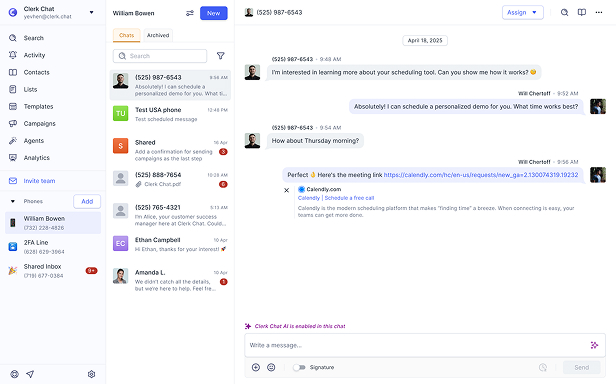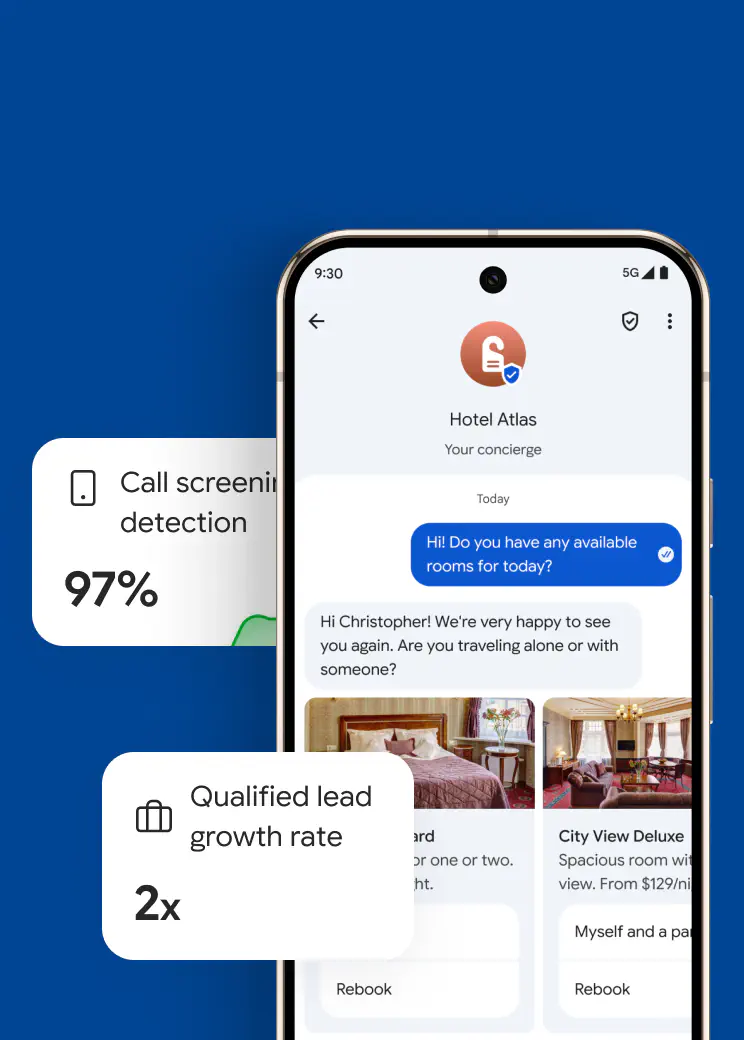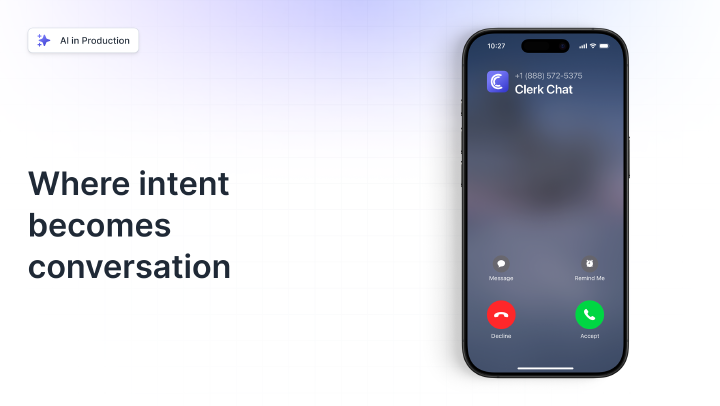Meet Agentic AI: A New Chapter for Intelligent Automation
By William Bowen
- Published: May 22, 2025
Key points in this article:
- Agentic AI goes beyond reactive AI by autonomously planning, problem-solving, and completing multi-stage tasks with minimal human oversight.
- Core technologies include LLMs, machine learning, RPA, and data analytics, which enable agentic AI to “perceive, reason, act, and learn” in real time.
- Agentic AI transforms automation, handling complex, decision-intensive workflows across multiple systems without constant human input.
- Industry use cases span insurance, logistics, finance, healthcare, sales, and more, radically speeding up operations while boosting efficiency.
- Key benefits include enhanced versatility, higher autonomy, improved customer experiences, and freed-up human teams for more creative tasks.
- Now is the time for businesses to explore agentic AI, leveraging platforms like Clerk Chat to harness its game-changing benefits securely and efficiently.
If you thought generative AI and conversational AI platforms revolutionized business processes, just wait. Agentic AI is here, propelling us into a new era of intelligent automation, personalization, and customer service.
Unlike standard AI tools, agentic systems don’t just react to user input. They can reason, plan, solve problems, and complete multi-stage tasks, all without human direction. These tools use sophisticated reasoning algorithms, iterative planning, and a range of AI technologies to solve problems just like humans, whether they’re optimizing supply chains or handling a customer query.
For instance, with agentic AI in retail, an ecommerce company could build a system that optimizes inventory levels, monitors supply chains, and updates customers about orders automatically.
So, what is agentic AI, how does it work, what are the use cases for business leaders, and what does it all mean to the future of enterprise intelligence?
In this article:
What is Agentic AI and How Does it Work?
Agentic AI is a type of artificial intelligence capable of planning, solving problems, making decisions, and taking action with virtually no human supervision. These tools can adapt in real time to evolving data and reason through tasks, just like a human being could.
To put into context, traditional AI systems – even generative AI and conversational AI tools, are inherently “reactive”. They respond to input from a user, and generally focus on one task at a time. For instance, a chatbot powered by AI in ecommerce might scan through a database to find an answer to a customer’s question about an order based on a prompt.
Agentic AI is proactive. These tools can act autonomously to achieve specific goals without human guidance. For example, Agentic AI in healthcare could mean using bots to create personalized treatment plans for patients. The bot would realize it needed to scan patient histories and explore data from connected platforms to create that treatment plan. It would do so, then build the plan, send it to a medical professional for approval, and share it with a patient—all without prompts.
Meet Clerk Chat’s AI Agents.
How Does Agentic AI Work?
At first, it might seem like agentic AI tools think just like a human being, but they actually rely on a complex range of different technologies, such as machine learning, natural language processing, LLMs, and robotic process automation systems.
Some models harness the creative abilities of generative AI models. On a broad scale, Agentic systems move through a series of step-by-step processes. They:
- Perceive: The bots or tools gather and process data from numerous sources, such as CRM platforms, sensors, databases, and digital interfaces. They decide on the data they need based on the goals they need to achieve (such as helping a customer complete an order).
- Reason: Next, a large language model works as a reasoning engine, helping the bot to understand tasks, generate action plans, and coordinate specialized models for certain functions, like visual data processing or content creation. This step usually relies on techniques like retrieval-augmented generation to enable access to data sources.
- Act: Once it has a plan, the agentic AI tool jumps into action, integrating with external tools and software through APIs to execute tasks. For instance, a customer service solution might generate content to guide a user through troubleshooting a problem. Companies can use guardrails during this stage to ensure that agents execute tasks safely and correctly.
- Learn: At the end of a task, an agentic system learns from the outcomes, identifying whether it was successful in achieving its goal and which roadblocks it encountered along the way. That allows it to become more effective over time.
Agentic AI vs AI Agents: What’s the Difference?
Agentic AI isn’t exactly the same as an “AI Agent”. Agentic systems are all about autonomy. They can make decisions, take action, and learn independently to achieve specific goals. AI agents, on the other hand, are typically built to complete specific tasks.
For instance, an agent like the Clerk Chat assistant could be designed to help customers troubleshoot common software problems or guide buyers towards the right product based on their needs. These tools automate simple, repetitive tasks, but they don’t have the same decision-making capabilities as Agentic AI. In fact, some agentic systems use multiple “AI agents” through API calls to complete certain tasks, like creating content.
Agentic AI vs Generative AI: What’s the Difference?
Similarly, agentic and generative AI tools might seem similar on the surface, but their focuses differ. Generative AI is still a reactive AI technology that responds to prompts to create content—whether it’s for knowledgebase articles, troubleshooting steps, or marketing purposes.
Gen AI excels at creating new content in various formats. For instance, you might use a tool like ChatGPT to create personalized content for your AI-powered text messaging strategy. Or you might use a tool to create code, write articles, produce poems, or even design music and videos.
Agentic AI compared to AI agents, is more about action. It might draw on generative AI tools for certain tasks, but it concentrates on achieving specific goals with multi-stage processes.
The Technological Advancements Powering Agentic AI
As mentioned, Agentic AI builds on various technologies, from traditional machine learning solutions to deep learning and neural networks, large language models, and generative tools.
The journey to agentic tools started with traditional chatbots. Simple, rule-based digital assistants that used decision trees and pattern matching to automate conversations. These tools revolutionized human-machine interaction, but they were limited in their ability to understand and respond to complex queries. Those tools laid the foundation for innovations in human-machine conversations.
Chatbots led to the creation of conversational AI technologies (learn more about agentic AI vs. conversational AI here), such as natural language processing and understanding tools, LLMs, and generative AI bots.
Those technologies, combined with robotic process automation and data analytics, form the foundation of how today’s agentic AI solutions work.
Large Language models, for instance, form the brains behind agentic AI, allowing agents to interpret and respond to complex instructions, and engage in meaningful conversations. Those tools, combined with natural language processing and data analytics systems allow for advanced reasoning, which ensure agentic systems can make autonomous decisions.
Machine learning also supports agentic tools, allowing them to constantly learn from vast amounts of data and new interactions and become increasingly adaptable to different situations. Most tools draw on cutting-edge machine learning techniques, like reinforcement learning, which allows systems to learn from trial-and-error experiences.
Today, agentic tools combine all of these technologies, with API connections to various software solutions, like CRM, ERP, and HR tools, to automate a huge range of processes.
Exploring Agentic AI Automation
Most modern forms of artificial intelligence deliver numerous benefits to businesses, from opportunities to dive deeper into vast datasets to improvements in creativity. The benefits of agentic AI are versatile too (more on that later). But where this technology really excels is in transforming automation. Agentic automation is reshaping how workflows are completed in every industry.
Unlike traditional automation tools, which complete actions based on strict rule sets, agentic automation tools are dynamic and context-aware. They can combine the actions and abilities of multiple AI agents, RPA systems, and people to complete multi-stage tasks.
For example, agentic AI in manufacturing can empower companies to automate everything from predictive maintenance and machine checks using IoT devices, to supply chain and inventory management, human resource allocation, and predictive analytics.
All an agentic tool really needs is an “end goal” and connections to the right data and systems. Then, it can complete a range of tasks without human intervention, something we haven’t been able to achieve before at any scale.
Meet Clerk Chat’s AI Agents.
The Use Cases for Agentic AI
Ultimately, agentic AI can transform virtually any process in any industry. Its ability to quickly, dynamically, and intuitively automate tasks with precision and accuracy can revolutionize how teams work, reducing the need for human workers on a massive scale.
For instance, agentic AI in human resources can automate processes like sourcing, vetting, interviewing, and onboarding team members. Agentic AI in education, on the other hand, can handle everything from creating lesson plans for students to grading papers, handing out test scores, and delivering real-time feedback and guidance.
Let’s take a look at some of the most significant use cases across sectors:
Insurance: Streamlining Claims Processes
The potential for agentic AI in insurance is phenomenal, as it can easily automate tasks that would otherwise be time-consuming and error-prone. For instance, rather than having to handle claims processes manually, insurance companies can use agentic technologies to automate every step.
Agentic systems can handle filing, analyzing, and even issuing payouts for claims, all without human intervention. An AI insurance agent can even use pre-existing data to validate a claim before sending it through to a human agent for approval, reducing processing times and errors, while simultaneously improving the customer experience.
Logistics: Optimizing Supply Chains
Using agentic AI for supply chain management allows companies to reduce costs, minimize inefficiencies, and mitigate delays rapidly. The right software solutions can analyze huge volumes of data instantly, optimize delivery routes, predict potential issues, and even adjust inventory levels based on fluctuations in demand.
This all helps to ensure that customers get a better experience (with real-time visibility into the availability of products and how quickly they’re being delivered). Plus, it can help businesses reduce costs and risks at scale, facilitating sustainable growth.
Finance: Empowering Intelligent Decisions
Agentic AI in financial services has the potential to transform decision-making. Software agents can analyze market trends, assess investment opportunities, create personalized financial plans for individual clients, and more.
Since they won’t have to spend as much time analyzing data and creating reports themselves, financial advisors can focus on delivering personalized customer service, building relationships with clients, and exploring new opportunities. Agentic tools can even help companies in the finance sector mitigate risks, by identifying potential risks, vulnerabilities, or signs of fraud in transactions.
Healthcare: Accelerating Treatment Development
Many healthcare companies are already relying on AI for marketing, customer service, research, and more. Agentic AI in healthcare unlocks a new world of opportunities for drug development and enhancing patient experiences. Agentic tools can sort through data rapidly, to zero in on potential drug options, and predict their potential efficacy, expediting the research process.
They can also examine patient data to create and suggest personalized treatment plans for individuals based on their unique needs and medical history. Plus, these tools can offer 24/7 support, offering users access to information about prescriptions, treatment strategies, and more. They can even use conversational AI tools to send out automatic appointment reminders.
Sales: Enhancing Training and Win Rates
Agentic AI tools can simplify a number of tasks for sales professionals. AI solutions like HubSpot’s Breeze platform can help companies identify and qualify leads, find contact details for decision-makers, schedule appointments for demonstrations, and more.
There are also AI tools for sales teams that can coach professionals, providing personalized human feedback in real time and access to crucial data during tasks. These solutions can even monitor performance scores in real time and share insights with supervisors.
Analysis: Accelerating and Optimizing Testing
Agentic AI helps companies get more value out of their data, whether they’re looking for growth opportunities, friction points, or security issues. For instance, agents can create ongoing reports about a business’s performance or customer service strategies and suggest proactive improvements. They can even update and improve marketing strategies in real time based on campaign performance.
AI systems can also boost security and privacy. They can analyze data from networks, camera feeds, IoT sensors, and more to consistently improve and upgrade businesses’ security systems, focusing on both physical security and cybersecurity tasks.
Marketing and Development: Enhancing Creativity
While agentic AI isn’t the same as generative AI, it can draw on generative tools to create content. For instance, GenAI models could be used to create marketing copy, while agentic AI systems give the prompts necessary to create that content, then autonomously deploy it to the right channels at the most effective times.
Agentic systems can go beyond creating basic written content too. It can empower businesses to produce videos, podcasts, and more in seconds. Plus, some tools can help with code development, assisting businesses in producing new applications faster. Some experts believe AI will even automate around 30% of the work of software developers by 2030.
All Industries: Transforming Customer Service
Delivering exceptional customer experiences is a top priority for every industry. That’s why so many companies are embracing AI in customer service, using cutting-edge chatbots and virtual assistants to deliver 24/7 personalized customer support across channels.
While conversational AI for sales teams and customer service experts already unlocks incredible business opportunities, agentic AI takes things a step further.
With agentic systems, companies can provide every customer with a dedicated virtual assistant that not only answers questions, but proactively offers relevant information and recommendations based on previous interactions. Companies enhancing customer experience with agentic AI can even use these tools to ensure customers can complete a range of tasks seamlessly without human input, like placing or cancelling an order, or requesting a refund.


The Transformative Benefits of Agentic AI Technology
Agentic AI is quickly taking the world by storm, transforming every industry and every business segment. Although many of the use cases for this technology are similar to the applications supported by other AI tools, agentic systems offer some unique benefits, such as:
- Improved versatility: Many AI solutions are designed for specific tasks – like creating content. Agentic AI can draw on the specialist skills of multiple AI tools to complete multiple tasks, from checking data to analyzing visuals and even creating content.
- Greater autonomy: Agentic AI learns automatically over time, drawing insights from each interaction to improve performance without additional training. This means that businesses benefit from higher-quality tools without extra work.
- Increased efficiency: Since software agents can now take on more complex, decision-intensive tasks, more processes can be automated. This allows people to actually focus their attention and energy on creative, strategic initiatives.
- Enhanced customer experience: Building on conversational customer engagement solutions and AI bots, agentic tools can enhance customer experiences. They can make every interaction with a customer more convenient, personalized, and efficient.
- Augmented human performance: Rather than replacing human employees, agentic tools can enhance human performance, productivity, and creativity. They can form a powerful partnership with existing workforces, boosting engagement and business results.
On top of all that, agentic solutions are inherently flexible – platforms are already emerging, like Agentforce from Salesforce, that allow companies to build their own custom agentic AI workflows, with unique API connections, and industry-specific guardrails.
The Risks and Challenges to Overcome
There’s no denying that agentic AI is revolutionary, but any form of artificial intelligence comes with risks. Whether you’re using agentic AI in retail, healthcare, or finance, you’ll still need to be aware of the core challenges that influence businesses, such as:
Autonomy
The autonomous nature of agentic AI is beneficial, but it’s a double-edged sword. Companies need to be cautious about the decision-making power they grant to machines, or they risk falling victim to ethical and compliance issues. You’ll need to invest in guardrails to ensure AI-driven actions align with legal and ethical standards.
Transparency and Trust
The way agentic tools make decisions and reason through tasks can be difficult to understand. This leads to issues with “black box AI”, which makes it hard to hold specific people accountable for an AI tool’s actions. Ensuring AI remains transparent and explainable will be crucial for companies embracing agentic tools.
Security and Privacy
Like all forms of AI, agentic tools rely on access to vast amounts of data. They often draw on data from different platforms through APIs, which can lead to potential security gaps. Business leaders will need to be cautious about ensuring that their data remains protected against criminal actions.
Agentic AI Implementation Best Practices
So, how do you unlock all the benefits of agentic AI, without falling victim to the challenges? The simple answer is to develop the right strategy. Just as you need to think carefully about how you’re going to deploy conversational AI for customer service, or use generative AI for content creation, you should be taking a cautious approach to working with agentic tools.
Here are our top tips for success:
- Focus on Governance: Establish clear governance frameworks and compliance measures from day one. This includes figuring out how you’re going to make sure team members are using agentic tools ethically, and transparently throughout your organization. A strong plan should help you to avoid common compliance risks.
- Prioritize Security: Be cautious about keeping your data safe. Make sure any APIs you’re using with your tools are secure, and encrypt data both at rest and during transit. Make sure you’re up-to-date with the latest data privacy and security regulations governing your industry too – remember they can change regularly.
- Choose the Right Tools: Find a solution that aligns with your business goals. For instance, if you want to enhance your AI-powered text messaging strategy, without spending a fortune on complex technologies, Clerk Chat offers a secure, easy-to-use and affordable solution that integrates seamlessly with CRM, collaboration, and other workplace software.
- Commit to Continuous Improvement: Constantly test your AI systems to ensure that they’re delivering the right results. Don’t just focus on things like productivity gains or efficiency improvements. Think about how your technologies are actively improving customer and employee experiences.
Finally, always keep the human in the loop. Agentic AI might be able to act autonomously, but you still need to ensure your human employees are implementing the right guardrails, using the technology effectively, and watching out for signs of potential issues.
The Future of Agentic AI: What’s Next?
We’re still in the early stages of the agentic AI revolution, but the impact of this technology is already astronomical. By giving companies access to machines that can operate with near-human intelligence, agentic tools are revolutionizing teamwork.
Agentic platforms allow organizations to create a virtual workforce that can significantly augment their human teams, opening up new opportunities in regard to research, innovation, and customer service.
Going forward, this technology will only grow more powerful, as AI models continue to evolve, adapting to new styles of human input, and developing new reasoning skills. At the same time, evolving platforms will make it easier for companies to connect their agentic tools to multiple systems, streamlining tasks across sales, service, product development, and HR workflows.
The possibilities are virtually endless, and now’s the perfect time for businesses to start exploring. Are you ready to discover what cutting-edge AI technologies can do for your organization?
With Clerk Chat, you can tap into innovative conversational AI solutions, custom-made to support sales, marketing, and customer service teams. Our easy-to-use platform is feature-rich, affordable, and flexible enough to integrate with all your existing business tools.
Embrace the new era of intelligent business communication with Clerk Chat.
Will’s latest superpower is building innovative AI solutions to add value for clients. He's passionate about all things AI, entrepreneurship, and enjoys staying active with sports and outdoor activities.
In this article:
- What is Agentic AI and How Does it Work?
- The Technological Advancements Powering Agentic AI
- Exploring Agentic AI Automation
- The Use Cases for Agentic AI
- The Transformative Benefits of Agentic AI Technology
- The Risks and Challenges to Overcome
- Agentic AI Implementation Best Practices
- The Future of Agentic AI: What’s Next?
Ready to use your business number for text messaging?
Thousands of businesses are already experiencing the power of conversational messaging through SMS. Join us. Free trial and paid tiers available.
Get Started#Subscribe
Get product updates in your inbox
Tutorials, features, and Clerk Chat news delivered straight to you.



